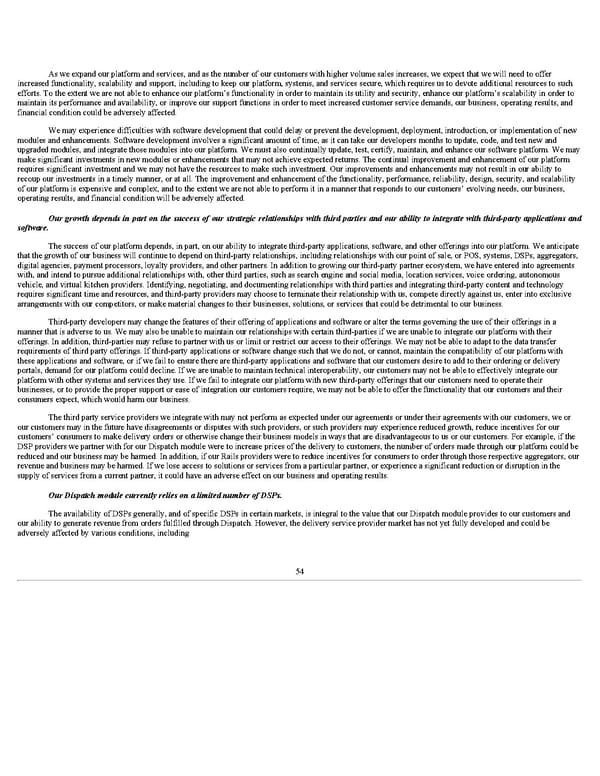As we expand our platform and services, and as the number of our customers with higher volume sales increases, we expect that we will need to offer increased functionality, scalability and support, including to keep our platform, systems, and services secure, which requires us to devote additional resources to such efforts. To the extent we are not able to enhance our platform’s functionality in order to maintain its utility and security, enhance our platform’s scalability in order to maintain its performance and availability, or improve our support functions in order to meet increased customer service demands, our business, operating results, and financial condition could be adversely affected. We may experience difficulties with software development that could delay or prevent the development, deployment, introduction, or implementation of new modules and enhancements. Software development involves a significant amount of time, as it can take our developers months to update, code, and test new and upgraded modules, and integrate those modules into our platform. We must also continually update, test, certify, maintain, and enhance our software platform. We may make significant investments in new modules or enhancements that may not achieve expected returns. The continual improvement and enhancement of our platform requires significant investment and we may not have the resources to make such investment. Our improvements and enhancements may not result in our ability to recoup our investments in a timely manner, or at all. The improvement and enhancement of the functionality, performance, reliability, design, security, and scalability of our platform is expensive and complex, and to the extent we are not able to perform it in a manner that responds to our customers’ evolving needs, our business, operating results, and financial condition will be adversely affected. Our growth depends in part on the success of our strategic relationships with third parties and our ability to integrate with third-party applications and software. The success of our platform depends, in part, on our ability to integrate third-party applications, software, and other offerings into our platform. We anticipate that the growth of our business will continue to depend on third-party relationships, including relationships with our point of sale, or POS, systems, DSPs, aggregators, digital agencies, payment processors, loyalty providers, and other partners. In addition to growing our third-party partner ecosystem, we have entered into agreements with, and intend to pursue additional relationships with, other third parties, such as search engine and social media, location services, voice ordering, autonomous vehicle, and virtual kitchen providers. Identifying, negotiating, and documenting relationships with third parties and integrating third-party content and technology requires significant time and resources, and third-party providers may choose to terminate their relationship with us, compete directly against us, enter into exclusive arrangements with our competitors, or make material changes to their businesses, solutions, or services that could be detrimental to our business. Third-party developers may change the features of their offering of applications and software or alter the terms governing the use of their offerings in a manner that is adverse to us. We may also be unable to maintain our relationships with certain third-parties if we are unable to integrate our platform with their offerings. In addition, third-parties may refuse to partner with us or limit or restrict our access to their offerings. We may not be able to adapt to the data transfer requirements of third party offerings. If third-party applications or software change such that we do not, or cannot, maintain the compatibility of our platform with these applications and software, or if we fail to ensure there are third-party applications and software that our customers desire to add to their ordering or delivery portals, demand for our platform could decline. If we are unable to maintain technical interoperability, our customers may not be able to effectively integrate our platform with other systems and services they use. If we fail to integrate our platform with new third-party offerings that our customers need to operate their businesses, or to provide the proper support or ease of integration our customers require, we may not be able to offer the functionality that our customers and their consumers expect, which would harm our business. The third party service providers we integrate with may not perform as expected under our agreements or under their agreements with our customers, we or our customers may in the future have disagreements or disputes with such providers, or such providers may experience reduced growth, reduce incentives for our customers’ consumers to make delivery orders or otherwise change their business models in ways that are disadvantageous to us or our customers. For example, if the DSP providers we partner with for our Dispatch module were to increase prices of the delivery to customers, the number of orders made through our platform could be reduced and our business may be harmed. In addition, if our Rails providers were to reduce incentives for consumers to order through those respective aggregators, our revenue and business may be harmed. If we lose access to solutions or services from a particular partner, or experience a significant reduction or disruption in the supply of services from a current partner, it could have an adverse effect on our business and operating results. Our Dispatch module currently relies on a limited number of DSPs. The availability of DSPs generally, and of specific DSPs in certain markets, is integral to the value that our Dispatch module provides to our customers and our ability to generate revenue from orders fulfilled through Dispatch. However, the delivery service provider market has not yet fully developed and could be adversely affected by various conditions, including 54
 Q3 2021 10Q Page 59 Page 61
Q3 2021 10Q Page 59 Page 61